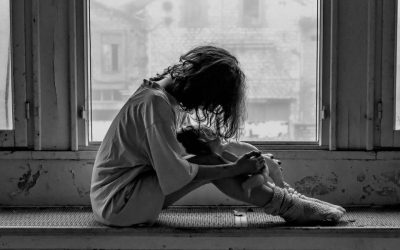Lost in the Dark of Life Transitions
Have you ever watched the sun rise? Do you know that moment just before the sun comes to the surface, where it is still dark and you begin to see a glow coming up from the horizon? And in this moment you feel an excitement building like something big is about to happen. This is the moment of transition or transformation that we trust happens every morning. We know that night comes and at some point in the early morning the sun will surface.
We experience this same transition within ourselves throughout our lives. When we experience dark times we can lose faith that this transition will happen. In our worry over what is wrong with us we can easily sink deeper into darkness.
I think most of us love watching the sunrise or are in awe seeing a full moon or a dark sky full of stars on a clear night. These are images of beauty that inspire and leave us feeling connected to something bigger than ourselves. Our own personal dark times can also be beautiful and lead to inspiration and growth if we learn to have faith while sitting in the darkness.
The Grief and Depression of Life Transitions
Like you, I’ve also experienced life transitions. There was a time in my life when I felt completely lost. My life felt bleak. I was disconnected from my family and my partner. Night after night, my partner and I would sit silently on the couch mindlessly watching TV and feeling like we were living in two separate realities. I was incredibly disillusioned with my work and struggled to know who I was anymore. Self-doubt and worthlessness were constant companions. I could have called it depression. Those more spiritually inclined may have named this the ‘dark night of the soul’. Pop culture probably would have identified it as a midlife crisis. Whatever it was, I was desperate to move away from this painful and uncomfortable place. I wanted a meaningful life – one where I felt lightness and contentment again. During this dark time,simple tasks such as grocery shopping or doing laundry felt heavy. Grief and despair overwhelmed me. I spent days crying, like really crying. I felt lost. I was devastated with the disconnection in my relationships, especially with my sister who used to be my best friend. I was dripping in anger at the world. I felt ripped off. I was frustrated with the superficialness of the interactions in my family relationships.
What’s wrong with me? Why do I feel so lost?
Even though I am a therapist, I looked to Google for help. I didn’t trust my own experience and I was craving validation from others. I frantically searched for an explanation, for a solution that would rescue me from this despair. Though I felt morsels of comfort, I left disconnected. I couldn’t find anything that truly resonated with my experience. There were a lot of articles and blog posts but they all seemed too simplistic. Some suggested that a meditation practice would help me navigate through this discomfort. Others emphasized self care but few really spoke to the discomfort that I was feeling. The suggestions I found made me more angry because I had been meditating and concentrating on my self care already, with no results.
Feeling lost is a constant theme in my clinical practice. It is a normal experience but something we don’t talk about because, as a society, we have a tendency to want to fix the problem or do something to relieve the pain. There are many instances where medication is a necessary support while experiencing a dark time and a consultation with your Family Doctor is always important to consider. But from a psychological perspective, it is rare that we are told to turn towards the pain and be in it. And even rarer that we discuss the value of allowing space for these uncertain moments of feeling lost. As a result, we have lost faith in the experience of being in despair and how it can guide us to more meaning.
Trust the Process of Life Transitions
Deep down, I felt like all I had to do was trust this process. As a therapist, I guide my clients to be in their emotional distress. And I have witnessed how turning towards emotions helps us move through them. So just as night turns to day, this personal darkness would also lead to lightness and meaning. All I had to do was weather the emotional storm.
I decided to embrace the simple practice of giving space to move through whatever emotions were present each day. This literally looked like waking up early before anyone was awake and sitting down with my cup of coffee. I would reflect on the past, cry, sometimes I would journal or scribble on the page with pastels. I came to rely upon this morning solitary practice and felt out of sorts if I skipped it.
This was a process. It needed time, trust, and patience. There were many moments of clarity, but also a lot of foggy days where I couldn’t see the light. It was grief, letting go of old wounds that demanded to have faith in the natural unfolding. Ultimately, letting go of the hope that there would be a magical ritual that would put an end to my suffering.
A practice of giving space and turning towards our pain can look very different for each person. It can be taking a few moments before you get out of bed or being mindful in the shower, to really ask yourself how you are feeling and to listen without judgment. And most importantly, it is important to tend to yourself with compassion by lowering your expectations and being gentle. Sometimes just making it through the day is enough. We are making progress when our emotions start to flow and we no longer feel the need to contain or to brace ourselves. Our bodies will feel calmer, quieter and lighter, even if there are still a lot of emotions. We start to learn to trust ourselves again.
So name it depression or a midlife crisis – it doesn’t matter what you call it. It’s about learning to value the darkness and the light equally and trusting in the unfolding that we see in the natural world every day.
Feeling lost is a normal part of change and transition in our life. It is okay to feel lost.
If life feels dark and if you feel lost, there is nothing wrong with you. You don’t need to figure out what’s wrong nor find the solution. Emotions are not meant to be fixed. We do not need to go searching for understanding. Understanding will come naturally once you’ve acknowledged your emotions.
Learning to turn towards our emotions and then move through them is the key to finding inspiration and meaning when we are in a crisis.
Sometimes we need support and guidance through this process. Support can come in many forms, reading the experiences of others, talking with a friend and individual therapy. Trust that transitions are temporary and this darkness will not last forever. The sun will rise again.




0 Comments